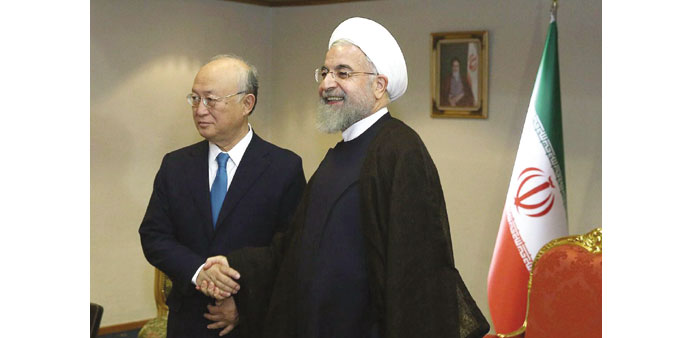Iranian President Hassan Rouhani greets the head of the UN’s atomic watchdog Yukiya Amano during a meeting in Tehran.
AFP/Vienna
Foreign ministers from major powers returned yesterday to tough Iran talks warning that a breakthrough was not yet in sight, as the UN atomic watchdog head met Iran’s president in Tehran.
“I don’t think we are at any kind of breakthrough moment yet,” British Foreign Secretary Philip Hammond said as he arrived in the Austrian capital for a sixth day of intense negotiations ahead of the new July 7 deadline.
But Hammond stressed: “The work goes on. You’re going to see over the next few days ministers coming and ministers going to maintain the momentum of these discussions.”
The P5+1 powers - the US, Russia, China, Britain, France and Germany - are seeking to finalise a long-sought accord which will put a nuclear bomb beyond Iran’s reach, in return for lifting biting sanctions against the Islamic republic.
It would end a 13-year standoff over Iran’s suspect nuclear programme, and draw the curtain on almost two years of intense negotiations which resumed in earnest after President Hassan Rouhani came to power in August 2013.
“It is clear that we are not there yet. There are small and big obstacles, and we are working on removing these,” said German Foreign Minister Frank-Walter Steinmeier.
“Whether everyone’s will and courage will be enough at the end of the day is a question that we can’t answer yet.”
“Some issues have progressed, others not yet,” added French Foreign Minister Laurent Fabius.
China’s Foreign Minister Wang Yi was more upbeat, saying all sides “need to make positive efforts”.
“We have confidence that finally the parties concerned will arrive at a fair, balanced and just agreement... I think there is high possibility” of a deal, Wang said through an interpreter.
Iran rejects allegations that it has been seeking to develop nuclear arms, and has resisted moves to give the International Atomic Energy Agency (IAEA) unparallelled access to sensitive military sites to verify its claims.
The visit of IAEA head Yukiya Amano to Tehran yesterday, at Iran’s invitation, is aimed at jump-starting a stalled probe.
“Any deal which ensures the pursuit and progress of the peaceful nuclear industry as well as the unconditional lifting of the unjust and illegal sanctions will be seen as positive,” said the chairman of Iran’s Supreme National Security Council, Ali Shamkhani, after meeting Amano.
Amano went into a meeting with Rouhani, Iranian television reported late yesterday.
Asked by journalists waiting outside the elegant Coburg Palace where the talks are being held if he was confident of a deal, Iranian Foreign Minister Mohamed Javad Zarif replied from the balcony of his room: “I have to be hopeful.”
He also denied reports he was returning to Tehran again for further guidance, saying: “No I am here.”
“We are working very, very hard and we have some very difficult issues,” US Secretary of State John Kerry said Wednesday, a day after the deadline for a deal was effectively extended to July 7.
“But we believe we’re making progress and we’re going to continue to work because of that,” he told reporters.
Tough issues include the pace and timing of sanctions relief, the mechanism for their “snapback” - reimposing sanctions swiftly if Tehran violates the deal - and Iran’s future development of faster nuclear equipment.
One possible compromise on the issue of Iran’s past and present nuclear activities might be strictly controlled “managed access” visits to military sites that reassure Iran that IAEA staff are not spying on its facilities, experts say.
Iranian agency ISNA said the country’s leaders would offer Amano “suggested solutions” to the deadlock.

